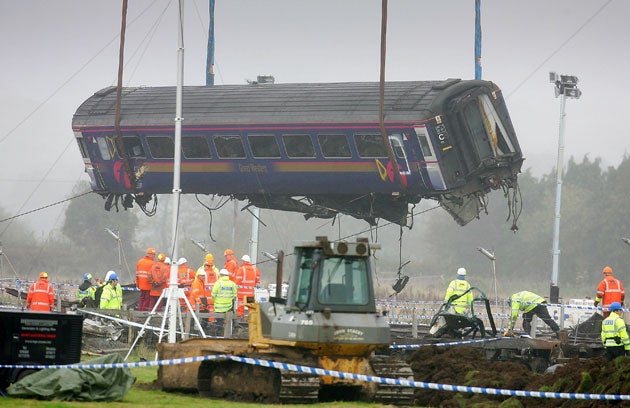Suicidal man faces £24,000 bill for rail firm's lost profits
Docklands Light Railway seeks compensation for loss of revenue while police rescued man from bridge

A suicidal man rescued from a railway bridge by police negotiators is facing a compensation bill for thousands of pounds to reimburse the train company for lost profits.
Michael Finnegan, 26, from London, is due in court this week for trespass, causing a public nuisance and obstructing a train after he threatened to jump off the bridge in London in July.
Mr Finnegan, who spent nearly two weeks in a psychiatric hospital after he was talked down by police negotiators, could be forced to pay Docklands Light Railway £24,000 to compensate for lost revenue while the line was shut for four hours.
Lawyers, police officers and mental health campaigners have condemned the decision by British Transport Police and the Crown Prosecution Service to prosecute Mr Finnegan as "heartless, extraordinary and bizarre".
Around 100 people commit or attempt suicide on the railways every year but survivors are usually treated sympathetically rather than as criminals. According to Mr Finnegan's lawyer, Greg Powell from Powell Spencer and Partners, the pending court case has placed him under "huge additional stress" while he tries to recover from a desperate period in his life.
This remarkable case comes when mental health experts are seeking an urgent summit with ministers amid fears that the Government has abandoned its pledge to reduce the suicide rate.
The Samaritans are among those on the front line who condemn plans to ditch the existing National Suicide Prevention Strategy for England just as rates of unemployment, drug and alcohol abuse and depression are rising – all of which are known to increase the risk of suicide.
Joe Ferns, the deputy director of Samaritans, said: "Suicide prevention work is difficult, but without a tangible goal to galvanise people there is a real danger this will lose out when budgets are cut. Principles do not prevent suicides; we need explicit targets with dedicated funding."
More than 4,000 people committed suicide in England last year – a 13.9 per cent drop since 1996. But despite the downward trend, the Government looks likely to miss its own target to reduce suicides by 20 per cent by 2010.
And despite the falling numbers, mental health experts insist that the job is far from done as rates still vary significantly in different regions, ethnic groups and age groups.
The Government's mental health tsar, Professor Louis Appleby, has told The Independent on Sunday he "will fight" over the next few months to make suicide prevention a priority in the new mental health strategy now being developed. There will, however, be no new target.
Join our commenting forum
Join thought-provoking conversations, follow other Independent readers and see their replies
Comments
Bookmark popover
Removed from bookmarks